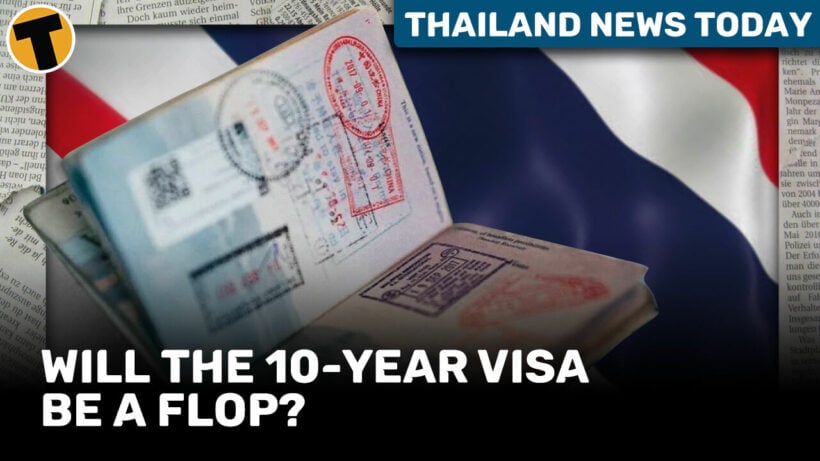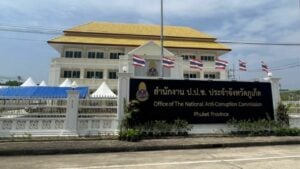Thailand News Today | Will the 10-year visa be a flop?

Officials in Thailand have been heavily pushing the new 10-year golden visa options for digital nomads and rich expats, with Europeans as a primary demographic, but is it really a big draw?
The government has predicted that one million wealthy tourists will jump at the chance to live long-term in Thailand over the next five years, but the programme that preceded this new visa, the Smart Visa, has only attracted 1,200 travellers since it was launched in 2018.
Officials projected that the 10-year visa will generate about 1 trillion baht, or about 27.6 billion dollars, which would depend on one million people using the visa, and each one spending an average of 1 million baht in Thailand. But, as the Smart Visa program attracted about 50% of European travellers, the new visa expects half the tourists using it to be European.
The executive director of the Netherlands-Thai Chamber of Commerce said there was some buzz over the new visa in the community, but mostly tepid interest in it.
“The first reactions have been lukewarm. I guess it needs more time and much more communication with the target audience to get some traction. I am not of the opinion that it will be a game changer for future Dutch investments.”
The executive director of the European Association for Business and Commerce in Thailand agreed, saying that some people already living in Thailand might benefit, but he’s not seeing a stampede to get the visa and pour into Thailand.
“Several business people already in Thailand have expressed interest in applying as it would alleviate administrative overhead for them. To date, we have not seen a material uptick or interest in moving operations to Thailand in anticipation of the scheme.”
Thailand has its sights set on attracting wealthy digital nomads, but so does the rest of Southeast Asia, with Indonesia eying a five-year digital nomad visa and Cambodia already incentivising tourists willing to invest US$100,000 in their “My 2nd Home” campaign.
The Thailand Board of Investment believes the kingdom is so popular with European travellers, with the EU’s nearly 715 billion baht topped only by Japan in Foreign Direct Investment figures, that the Long-Term Residence scheme will ultimately be successful as it prepares to launch.
On September 1, the 10-year visa option will be extended to four categories of travellers with an annual income of 80,000 dollars and at least 1 million dollars in assets. It comes with multiple entries permitted and a work permit issued and covers up to four dependents like children or spouses. Companies utilising these visas won’t be required to follow the standard four Thai employees per one foreigner rule.
The specific categories have additional requirements, with the “Highly Skilled Professionals” being limited only to jobs in sectors the Thai government has rated as essential.
People wanting to qualify as “Wealthy Global Citizens” need to invest at least half a million dollars into the Thai economy via property or bonds, while those who want to qualify as “Work-From-Thailand Professionals” need to be working for companies with a minimum of 150 million dollars in revenue over three years. But both of these demographics are not currently served by any previously existing visa in Thailand. The new visa would allow them to live long-term in the country without a Thai sponsor.
Many see these visas as a viable option to attract Europeans and others worldwide but worry that the rules and process will be too complex and convoluted. They say the paperwork must be streamlined and supporting documents to meet requirements be easy and minimal for the program to succeed. But then again, this IS Thailand.
——————
Just one day before PM Prayut Chan-o-cha’s premiership expires, the Constitutional Court still has not ruled if he can continue as Thailand’s leader or not, but the court of public opinion has spoken. A new phone survey from a group of universities, TV stations, and online media found that a whopping 93% of people do not want PM Prayut to remain in office after his eight-year term ends tomorrow.
While polls in Thailand are often eviscerated in the comment section for their small sample size, a coalition of eight digital television stations, online media sources, and lecturers from eight different universities garnered a total of 374,063 responses.
The poll was conducted over the phone just days ago on August 20 and 21 to get a quick snapshot of public opinion about whether PM Prayut should stay in office. It included responses from 4,579 Thai nationals living abroad. Some 348,511 people voted that they did not want the prime minister to remain in office now that his eight years are up. Just 25,552 people, less than 7% of those surveyed, believed he should be allowed to continue as PM.
Prayut, who takes little heed of poll data, has spent eight years in the PM office, and the current constitution allows a maximum of eight years for any prime minister. But the current constitution was only adopted four years ago. It’s this discrepancy that forms the basis of the hotly debated legal question: Does PM Prayut’s constitutionally mandated eight-year limit start from the date he took office or from the date the constitution was ratified?
The Election Commission was discussing the legality of his terms yesterday, and the Constitutional Court is due to make a ruling imminently. Opposition parties, legal scholars, academics, and activist groups, have been ramping up the pressure in their calls for him to step down as the term-ending date looms closer and closer.
—————-
A rise in Chinese tourism to Thailand may be on the horizon as the Civil Aviation Administration of China has requested quintupling the number of flights between the two countries.
There are currently three flights a week between Thailand and China but the Civil Aviation Authority of Thailand announced that they received a letter from the CAAC asking to ramp that up to 15 weekly flights.
China, which has continued to face Covid restrictions and limited international travel possibilities, has historically been a major source of travellers to Thailand, so the possibility of increased flights could be a huge boon to a struggling tourism market. The CAAT said though that these requested flights are mostly for business trips and other travel deemed essential and China’s strict Covid rules are still in place.
With the CAAT’s Chinese counterpart requesting more flights into Thailand, they have suggested reciprocity, asking Thailand to increase flights leaving the kingdom and heading to China as well. While they have limited capacity at some of the major airports like Shanghai, Beijing, and Guangzhou, they have asked authorities to give them a list of airlines based in Thailand and potential routes they would be interested in flying. The Chinese airports will then confirm if they can accommodate Thai-based flights.
The idea will be discussed with all the airlines based in Thailand and the CAAT will compile a list to submit to China sometime next week. The flights would then be fast-tracked and, if the airports in China can accommodate them, could launch as soon as September.
While the increase in flight frequency between Thailand and China will be basically for essential travel, for now, it builds the framework for if and when China relaxes its tight pandemic restrictions and tourism can recommence, something the Thai tourism market has been eagerly anticipating.
Latest Thailand News
Follow The Thaiger on Google News:


























